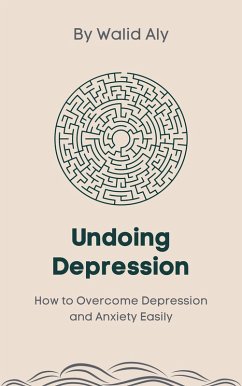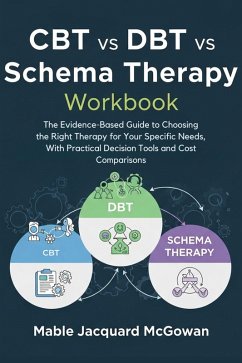
The Anatomy of Depression: The Placebo vs Non-Placebo Approach: (eBook, ePUB)

PAYBACK Punkte
0 °P sammeln!
The Anatomy of Depression: The Placebo vs. Non-Placebo Approach is an in-depth exploration of depression, focusing on its complex emotional, biological, and psychological roots. The book presents depression as a multifaceted condition, acknowledging the deep interplay between trauma, biology, and life experiences. It emphasizes the importance of understanding depression not only as a medical disorder but also as a personal, emotional experience that can vary widely between individuals.The book is structured around two primary approaches: placebo-based methods-focused on belief systems, routine...
The Anatomy of Depression: The Placebo vs. Non-Placebo Approach is an in-depth exploration of depression, focusing on its complex emotional, biological, and psychological roots. The book presents depression as a multifaceted condition, acknowledging the deep interplay between trauma, biology, and life experiences. It emphasizes the importance of understanding depression not only as a medical disorder but also as a personal, emotional experience that can vary widely between individuals.
The book is structured around two primary approaches: placebo-based methods-focused on belief systems, routines, and social expectations-and non-placebo approaches, which include scientifically-backed treatments such as medication and therapy. The placebo approach highlights how belief in treatment, structured routines, and positive reinforcement can help create real improvements in mood and mental health. It explores how routines and caregiver expectations can act as stabilizing forces in managing depressive symptoms.
On the non-placebo side, the book covers evidence-based treatments like antidepressants and Selective Serotonin Reuptake Inhibitors (SSRIs), detailing how these medications work to balance brain chemistry. Cognitive Behavioral Therapy (CBT) and other therapeutic methods are also explored as powerful tools for reworking negative thought patterns and building resilience. The book also emphasizes holistic approaches such as mindfulness, physical activity, and nutrition, illustrating how these lifestyle changes can support mental health and alleviate depressive symptoms naturally.
A central theme in the book is its trauma-informed perspective, arguing that depression is often rooted in unresolved trauma. The book suggests that early childhood experiences, genetics, and generational trauma can all contribute to the development of depression, framing it as an adaptive response to overwhelming emotional pain. This trauma-focused lens highlights the importance of addressing the root causes of depression, rather than solely treating the symptoms, offering a more compassionate and comprehensive approach to recovery.
In addition to exploring different treatments, The Anatomy of Depression offers practical strategies for managing depression day-to-day. It combines the power of routines, belief-driven methods, and non-placebo interventions to give readers a diverse toolkit for coping with their condition. The book encourages a personalized treatment plan, recognizing that depression manifests differently in each individual, and what works for one person may not work for another. By blending placebo and non-placebo approaches, it helps readers find the most effective treatment strategy for their unique experience.
Ultimately, The Anatomy of Depression provides a holistic, integrative approach to understanding and managing depression. It empowers readers to explore a range of treatment options, from belief-based methods to evidence-backed therapies, while considering how trauma and life experiences shape their mental health. The book encourages self-awareness, resilience, and a balanced approach to recovery, offering a path to long-term healing. Through both scientific insight and compassionate understanding, the book provides a roadmap for overcoming depression and building emotional well-being.
The book is structured around two primary approaches: placebo-based methods-focused on belief systems, routines, and social expectations-and non-placebo approaches, which include scientifically-backed treatments such as medication and therapy. The placebo approach highlights how belief in treatment, structured routines, and positive reinforcement can help create real improvements in mood and mental health. It explores how routines and caregiver expectations can act as stabilizing forces in managing depressive symptoms.
On the non-placebo side, the book covers evidence-based treatments like antidepressants and Selective Serotonin Reuptake Inhibitors (SSRIs), detailing how these medications work to balance brain chemistry. Cognitive Behavioral Therapy (CBT) and other therapeutic methods are also explored as powerful tools for reworking negative thought patterns and building resilience. The book also emphasizes holistic approaches such as mindfulness, physical activity, and nutrition, illustrating how these lifestyle changes can support mental health and alleviate depressive symptoms naturally.
A central theme in the book is its trauma-informed perspective, arguing that depression is often rooted in unresolved trauma. The book suggests that early childhood experiences, genetics, and generational trauma can all contribute to the development of depression, framing it as an adaptive response to overwhelming emotional pain. This trauma-focused lens highlights the importance of addressing the root causes of depression, rather than solely treating the symptoms, offering a more compassionate and comprehensive approach to recovery.
In addition to exploring different treatments, The Anatomy of Depression offers practical strategies for managing depression day-to-day. It combines the power of routines, belief-driven methods, and non-placebo interventions to give readers a diverse toolkit for coping with their condition. The book encourages a personalized treatment plan, recognizing that depression manifests differently in each individual, and what works for one person may not work for another. By blending placebo and non-placebo approaches, it helps readers find the most effective treatment strategy for their unique experience.
Ultimately, The Anatomy of Depression provides a holistic, integrative approach to understanding and managing depression. It empowers readers to explore a range of treatment options, from belief-based methods to evidence-backed therapies, while considering how trauma and life experiences shape their mental health. The book encourages self-awareness, resilience, and a balanced approach to recovery, offering a path to long-term healing. Through both scientific insight and compassionate understanding, the book provides a roadmap for overcoming depression and building emotional well-being.
Dieser Download kann aus rechtlichen Gründen nur mit Rechnungsadresse in A, B, CY, CZ, D, DK, EW, E, FIN, F, GR, H, IRL, I, LT, L, LR, M, NL, PL, P, R, S, SLO, SK ausgeliefert werden.













